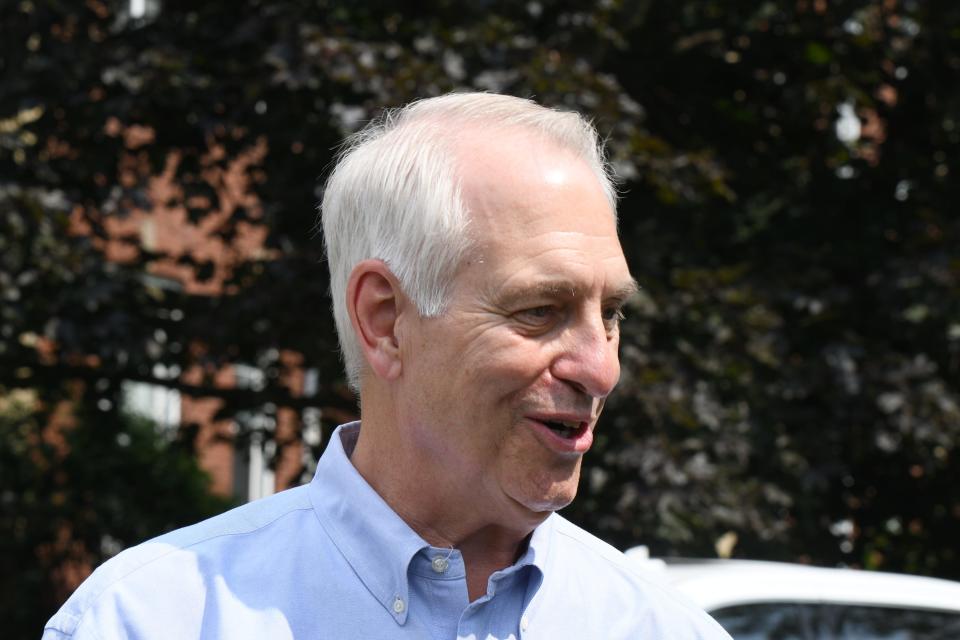County leaders drop Beidinger off health board as state rules change for appointments
After serving 7.5 years — three years as its president — Heidi Beidinger was unceremoniously dropped off of the St. Joseph County Health Board in July. Not by her choice.
She found out when she asked for the usual packet for the July 19 board meeting. The health department’s executive assistant briefly replied that she was no longer on the board.
So Beidinger met with the health board’s attorney, Marcel Lebbin, for the explanation. Lebbin attributes it to changes in a state statute this year that came with the passage of Senate Bill 4, which provides boosted state funding to county health departments.
Under new rules for counties with more than 200,000 residents (Section 23 of Indiana Code 16-20-2-5), the county commissioners made their six appointments to the health board. And the county council made its one appointment. None of them included Beidinger.
Now, with a total of nine board members needed, up from seven, South Bend’s and Mishawaka’s mayor each need to submit three names to the county commissioners, who will then pick one of each.
Both mayors have yet to submit names — and they admit that it has been a struggle.
When the county commissioners voted to approve their six names on July 5, they included five current health board members and one new addition, Dr. Elizabeth Lindenman, a local family physician affiliated with the South Bend Clinic.

Carl Baxmeyer, the commissioners’ president, said at the time that they didn’t want to make any changes to the health board, adding that the mayors could still recommend Beidinger. Lebbin also said that may be an option.
But the newly refashioned state statute makes that difficult, if not seemingly impossible. For counties with more than 200,000 residents, it specifies a list of professions from which mayors can choose their candidates. It’s the same list as the commissioners can choose from, except that it excludes physicians, physician assistants and public health professionals, including epidemiologists.
Beidinger fits in that last profession since she works as associate professor of the practice in the University of Notre Dame’s Eck Institute for Global Health, where her research focuses on public health.
South Bend Mayor James Mueller told The Tribune almost a month ago that he was struggling to find a way to nominate Beidinger as he dealt with what he called the statute’s “convoluted language.”

Mueller was trying to see if he could still fit Beidinger into one of the professions that he has as options: registered nurses, pharmacists, dentists, hospital administrators, social workers, attorneys with expertise in health matters, school superintendents, veterinarians, engineers and environmental scientists.
“We’re trying to see how tight those definitions are,” he said. “Continuity is important. Heidi made great strides while she was president. … We (the county) were receiving competitive grants.”
It's unclear why legislators excluded the three professions, but it appears that that provision was inserted while the bill was in committee late in the process. Likewise, for counties with fewer than 200,000 residents, two other professions are excluded from a mayor’s options: physicians and registered nurses.
Baxmeyer said he wasn’t aware of the statute’s limitations for mayors when the commissioners appointed their list.
Beidinger was originally appointed by South Bend Mayor Pete Buttigieg.
But Lebbin said that was before 2017, when the state statute changed so that only the county commissioners made appointments to the county health board. The commissioners allowed Beidinger and Dr. Michelle Migliore — who was appointed by Mishawaka Mayor Dave Wood — to remain on the health board “at the pleasure of the commissioners.”
Lebbin said he checked health department records, which show that commissioners never actually reappointed Migliore and Beidinger when their terms expired; they just allowed them to remain on the board.
Lebbin said he also contacted the Indiana Department of Health because the changed statute itself didn't specify what to do with the existing health board members. He said IDOH told him that, in effect, the slate was wiped clean and that officials would have to reappoint the board members.
So, Lebbin said it is his interpretation that Beidinger can't remain on the board unless she’s appointed. Beidinger, whose term ran through December, doesn’t agree. She feels she should at least be able to serve until the final two board vacancies are filled.
Dr. Migliore stays because the commissioners reappointed her in their list of six this year. Baxmeyer wouldn’t say why commissioners appointed her and not Beidinger. But Lebbin noted that it helps to fulfill something he’d been pushing for: to have three physicians on the board in case something happened to one of them. The state requires the board to have at least two physicians.
Wood is still seeking candidates.
“We have put out feelers and asked qualified people if they may be interested in being considered by the county,” he said, but so far, no one has expressed interest in the health board.
And there’s another wrinkle that both Mueller and Wood didn’t realize until The Tribune pointed it out: At this point, neither of them can nominate Republicans. The statute says that the health board cannot have more than five members from the same political party, and so far the all-Republican commissioners have appointed five Republicans: John Linn, Ellen Reilander, Kristin Vincent, Dr. Robert Hays and Dr. Lindenman.
Wood, a Republican, said, “That will make it even more difficult to find candidates.”
Mueller, a Democrat, may submit names as soon as next week, a spokeswoman for his office said.
He’d told The Tribune earlier that his list would be “all strong voices so we can pursue resources where they need to be and so disparities are addressed.”
Jill Kaps VanBruaene, a Democrat, was reappointed to the health board by the county council. Migliore is a Democrat, too.
All of this comes at a time when the county’s health department will seek a piece of the Health First Indiana dollars, created by Senate Bill 4, that could yield the department up to $4.2 million more in the first year and up to $8 million more in the second year. It will be a chance for the department’s leadership, now with new Health Officer Dr. Diana Purushotham, to make gains in an array of public health matters.
At a board meeting this summer, Beidinger, a Democrat who ran unsuccessfully for state representative last year, said she feared that she’d soon lose her seat on the health board thanks to politics.
She found it ironic that, when she met with Lebbin, he asked her to continue to lend her expertise in the department’s efforts to prevent lead poisoning.
“And yet you don’t want that experience and history on the board?” she asked.
Lebbin said she wasn’t actively removed from the board, deferring instead to the new state statute and the choices by commissioners and council members, plus the narrow chance that mayors could still appoint her.
Still, Beidinger said, “It’s (public health) something I’ve been passionate about for a long time. It’s very hurtful to be discarded this way.”

South Bend Tribune reporter Joseph Dits can be reached at 574-235-6158 or jdits@sbtinfo.com.
This article originally appeared on South Bend Tribune: Heidi Beidinger off county health board as Senate Bill 4 changes rules

